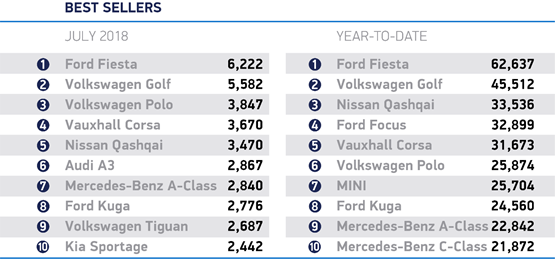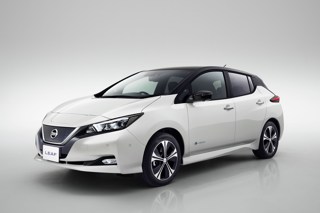The UK new car market remained stable in July, with year-on-year demand growing by 1.2%, according to the latest figures released today by the Society of Motor Manufacturers and Traders (SMMT).
There were 163,898 new cars were registered in the month, with the lion’s share – some 59% – coming from fleet and business registrations. There were 96,036 units registered to fleet and business in July compared to 94,313 units in July 2017 – an increase of 1.8%.
Although registrations by businesses with fleets of 25 cars or fewer fell by 10.2%, demand from large fleets grew by 2.6% and private buyers was up by 0.1% on the same month in 2017.
Year-to-date fleet and business registrations were down by around 6.4% at 822,916 units compared to 878,483 units in the first seven months of 2017.
In terms of fuel type, the market followed the trend of previous months, with diesel registrations falling 24.4% as petrol demand grew 20.1%.
Meanwhile, alternatively fuelled vehicles enjoyed an uplift of 21%, with market share of hybrids and plug-ins reaching a record 6.5%. Growth was particularly strong for plug-in hybrids, up by a third (33.5%), while hybrid registrations grew 17.5%, followed by battery electric cars, up 2.4%.
Year to date, the overall market remains down by 5.5%, broadly in line with expectations as demand begins to level out. In the first seven months of the year, almost 1.5 million new cars were registered by consumers and businesses in the UK.
Mike Hawes, SMMT chief executive, said: “The feel-good factor from a sun and sport-packed July, combined with some fantastic deals on a raft of exciting new models, clearly helped keep showrooms relatively busy last month.
“It’s great to see alternatively fuelled vehicles benefiting from this growth, and Government’s acknowledgement of the vital role new-tech diesel will play in its Road to Zero strategy should help more even more motorists benefit from the latest, safest and low emission technology over the coming months.”
Ashley Barnett, head of consultancy at Lex Autolease, welcomed the "slight uplift" in new car registrations, but told Fleet News that more clarity is needed to maintain this momentum.
"Drivers are still reluctant to make significant purchase decisions while there is uncertainty in the marketplace, specifically around the future tax treatment of company cars," he said.
“Businesses and consumers need to be able to make confident, informed choices, particularly if we are to meet the targets set out in the Government’s recent Road to Zero strategy.
"In order for 50% of new car sales to be Ultra Low Emission by 2030, we will need to see an additional 100,000 new AFV registrations each year between now and then.
"We expect registrations of new AFVs to keep gathering pace in the coming months and are supporting customers with the switch to electric vehicles if suitable, but more needs to be done to increase their appeal and ease of use for drivers.”
Jon Lawes, managing director of Hitachi Capital Vehicle Solutions, told Fleet News that he was seeing "huge demand" for AFVs. "The total number of new AFVs being registered is up more than 23% in the year to date, representing 16,000 more hybrid or electric cars on the road than at this point last year," he said.
“This demand for AFVs ties in with the trends we’re seeing in our own research, which shows that 73% of fleet owners think the Government can do more to support the move to AFVs. In addition, 82% of fleet managers believe it’s important to move towards AFVs and 42% of fleets are planning to add more AFVs within the next two years.
“As technology continues to improve and we see greater investment in infrastructure for AFVs, this will allow the car industry to support people and businesses on their journey to zero emissions.”
Sean Kemple, director of sales at Close Brothers Motor Finance, also wants more clarity around Government investment for charging points and the taxes paid on AFVs for consumer interest to translate to buying habits.
Furthermore, he said: "European diesel sales were at a 17-year low this month, and Brits are still uncertain about the Government’s low emission policies – this too needs to be addressed in order to bring stability to the market."


























Login to comment
Comments
No comments have been made yet.